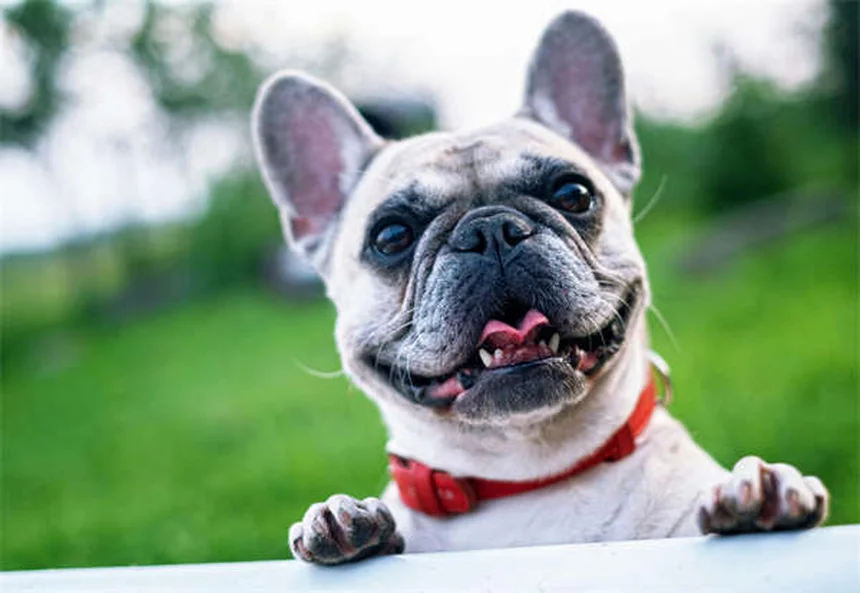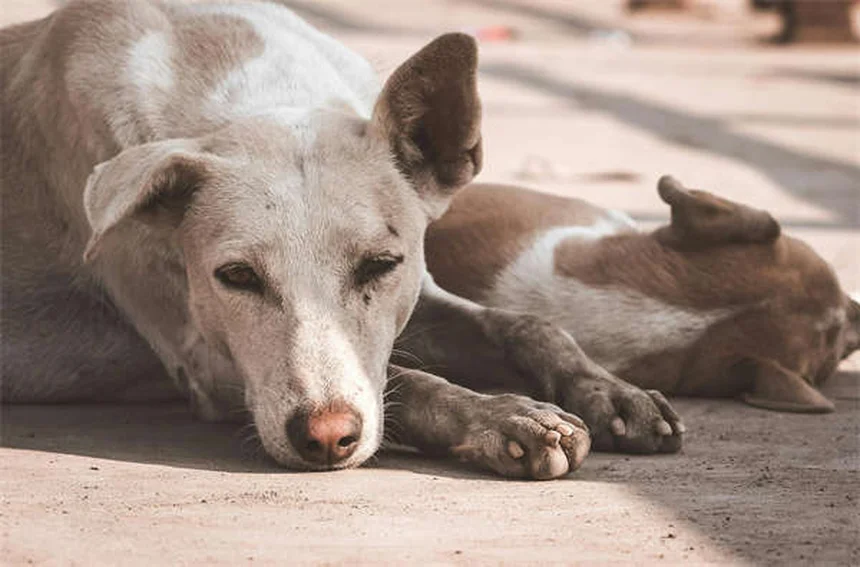Advertisement
Ever wondered what your dog's sleeping position means? The way your pup curls up, sprawls out, or cuddles close actually tells you a lot about their personality and how they're feeling. As a dog owner myself, I've learned that these sleeping habits are like little messages from our furry friends.The answer is: your dog's sleeping position reveals their comfort level, personality traits, and even health status. From the playful superman sprawl to the protective lion pose, each position gives us clues about our canine companions. I've seen this firsthand with my own dog - when he sleeps belly-up, I know he's completely relaxed and trusting in our home.In this guide, we'll break down the 6 most common dog sleeping positions and what they really mean. You'll learn how to spot when your pup is feeling content, alert, playful, or even a bit under the weather. Plus, we'll share some great bed recommendations to match your dog's favorite sleeping style!
E.g. :How to Train Your Dog to Come Every Time: Expert Recall Tips
- 1、Decoding Your Dog's Sleeping Positions
- 2、Understanding Your Dog's Comfort Needs
- 3、Creating the Perfect Sleep Environment
- 4、The Science Behind Dog Sleep Positions
- 5、Sleep Position Changes Through Life Stages
- 6、Sleep Position Myths Debunked
- 7、Enhancing Your Dog's Sleep Experience
- 8、FAQs
Decoding Your Dog's Sleeping Positions
The Side Sleeper - The Ultimate Chill Position
Ever walked into a room and found your pup sprawled on their side like they own the place? That's the side sleeper position, and it's basically your dog's way of saying "Life is good!" When dogs sleep like this with their belly partly exposed, it means they feel completely safe and relaxed in their environment.
Here's something funny - my neighbor's Golden Retriever sleeps like this so often that we've nicknamed him "Pancake" because he flattens out so much! These dogs are typically:
- Super easygoing
- Can sleep anywhere (even in weird places like your laundry basket)
- Often have the cutest dream twitches
| Best Bed Type | Why It Works | Our Pick |
|---|---|---|
| Orthopedic beds | Supports joints during deep sleep | FurHaven™ Ultra Plush Luxe Lounger |
| Cooling mats | Great for hot summer days | Arf Pets Self-Cooling Pad |
The Lion Pose - The Watchful Guardian
Have you ever noticed your dog sleeping with their head resting on their paws like a sphinx? That's the lion pose, and it's actually pretty clever. Dogs who sleep like this are saying, "I'm resting, but I'm still on duty!"
Why would your dog choose this position? Well, think about it - wouldn't you want to be ready to jump up if your favorite human needed you? These pups are:
- Incredibly loyal
- Always alert to their surroundings
- Often the first to notice when something's different
 Photos provided by pixabay
Photos provided by pixabay
The Superman - The Energizer Bunny
Picture this: your dog stretched out flat on their belly with all four legs extended. That's the superman position, and it's absolutely hilarious to see! This is the signature move of dogs who are full of energy, even in their sleep.
I'll never forget the time my friend's French Bulldog fell asleep like this mid-play session - legs still running in his dreams! Dogs who love this position:
- Are always ready for action
- Have playful, mischievous personalities
- Often wake up and immediately want to play
Understanding Your Dog's Comfort Needs
The Belly-Up - The Ultimate Trust Position
When your dog sleeps on their back with all four paws in the air, they're not just being silly - they're showing complete trust. This belly-up position is like your dog saying, "I know you've got my back!"
But here's a question you might be wondering: Is this position actually comfortable? The answer is yes! Dogs are smart about their comfort - they wouldn't sleep like this if it hurt. However, older dogs might switch positions as this can put pressure on their spine over time.
The Donut - The Cozy Ball of Fur
Ever seen your dog curled up in a tight ball with their nose tucked near their tail? That's the donut position, and it serves several important purposes. First, it helps conserve body heat - perfect for chilly nights. Second, it makes your pup feel secure, especially in new environments.
Here's a pro tip: if your dog suddenly starts sleeping like this when they normally don't, it might be worth checking with your vet. Sometimes this position can indicate they're not feeling their best.
Creating the Perfect Sleep Environment
 Photos provided by pixabay
Photos provided by pixabay
The Superman - The Energizer Bunny
Does your dog insist on sleeping pressed right up against you? Congratulations, you've got a certified cuddle bug! These dogs live for physical contact and will find any excuse to be close to their favorite humans.
But here's something to consider: Should you let your dog sleep in your bed? That's totally up to you! There's no right or wrong answer here. If you do allow it, just make sure your pup also has their own space for when you need some room.
Seasonal Sleeping Adjustments
You might notice your dog changing positions with the weather, and that's completely normal! In summer, they'll sprawl out to stay cool. In winter, they'll curl up tight to conserve heat. Being aware of these changes helps you provide the right sleeping setup year-round.
Remember, dogs sleep way more than we do - up to 20 hours a day for puppies! That's why giving them comfortable sleeping options is so important. Whether they're a side sleeper, a superman, or a cuddle bug, understanding their preferences helps you create the perfect rest environment for your furry friend.
The Science Behind Dog Sleep Positions
Temperature Regulation Through Sleeping Positions
Did you know your dog's sleeping position acts like their personal thermostat? When they sprawl out like a starfish, they're actually trying to cool down by maximizing skin exposure to air. My Labrador does this every summer afternoon on the cool kitchen tiles - we call it his "splat mode"!
Here's something fascinating: dogs have sweat glands only in their paw pads, so they rely heavily on body positioning and panting to regulate temperature. That's why you'll see them:
- Curled up tight when it's cold (reducing surface area)
- Sprawled out when hot (increasing surface area)
- Seeking cool surfaces like tile or concrete
 Photos provided by pixabay
Photos provided by pixabay
The Superman - The Energizer Bunny
Your dog's sleeping position reveals more than just physical comfort - it's a window into their emotional state. A study at the University of Pennsylvania found that dogs who sleep belly-up in new environments adjust faster to change. That's why shelter workers often look for this position when assessing a dog's comfort level.
Think about your own dog's behavior. When they first came home, did they sleep curled up? Now that they're comfortable, do they sprawl across your entire couch? That progression tells an amazing story of growing trust!
| Sleep Position | Emotional Meaning | Physical Benefit |
|---|---|---|
| Belly-up | Complete trust and relaxation | Cools core temperature |
| Lion pose | Alert and protective | Quick transition to action |
| Donut curl | Self-protective or cold | Conserves body heat |
Sleep Position Changes Through Life Stages
Puppy Sleep Patterns vs Adult Dogs
Puppies are the Olympic champions of sleep, clocking in up to 20 hours daily! But here's something you might not expect - they change positions far more frequently than adult dogs. Why? Their developing nervous systems and rapid growth mean they're constantly adjusting for comfort.
Remember when we brought home our 8-week-old German Shepherd? He'd start in a tight ball, then flop onto his side, then stretch out - all within a 20-minute nap! This constant movement helps their joints and muscles develop properly.
Senior Dog Sleep Adjustments
As dogs age, you'll notice their sleep positions become more deliberate and less varied. That's because older pups often develop arthritis or other joint issues. My 12-year-old Beagle now prefers sleeping on her side with a supportive pillow under her hips - a far cry from her puppy days of wild, sprawling naps!
Here's a helpful tip: orthopedic beds become crucial for senior dogs. The memory foam supports aging joints and makes position changes easier. We saw immediate improvement in our old girl's sleep quality after switching to one.
Sleep Position Myths Debunked
The "Alpha Dog" Sleep Position Misconception
Ever heard that dogs who sleep on their backs are asserting dominance? That's actually a myth! Modern canine science shows this position simply indicates comfort and trust. In fact, forcing a dog into this position as a "dominance exercise" can damage your relationship.
Think about it - would you feel comfortable showing your belly if you didn't feel safe? Exactly! Your dog's vulnerable positions are compliments to your caregiving, not power plays.
Do Certain Breeds Have Signature Sleep Styles?
While all dogs share basic sleep position meanings, some breeds do have hilarious tendencies. Greyhounds are famous for "roaching" (sleeping belly-up with legs straight in the air), while Bulldogs often sleep in what we call the "frog dog" position - belly down with hind legs splayed out behind them!
But here's the fun part - individual personality matters more than breed. Our neighbor's hyperactive Border Collie sleeps curled up like a cat, while our lazy Basset Hound sprawls like a starfish. Dogs, like people, have unique sleep personalities!
Enhancing Your Dog's Sleep Experience
Position-Specific Bedding Solutions
Matching your dog's preferred sleep position with the right bed can dramatically improve their rest. For side sleepers, look for beds with raised edges to support their head and neck. Donut curl lovers need circular beds with bolstered sides they can lean against.
We made the mistake of buying a flat pad for our side-sleeping Lab - big mistake! He kept waking up with a stiff neck until we got him a proper orthopedic bed with side support. Now he sleeps like a log (sometimes literally snoring like one too!).
The Role of Your Presence in Sleep Positions
Ever notice your dog changes positions when you enter or leave the room? That's because your presence directly affects their sense of security. Many dogs will shift from alert positions (like lion pose) to relaxed ones (like side sleeping) when their favorite human appears.
Here's a heartwarming example: our rescue dog used to sleep facing the door for months after we adopted her. Now, three years later, she sleeps belly-up with her back to the door - the ultimate sign she trusts us to watch over her while she rests.
E.g. :6 Dog Sleeping Positions and What They Mean | PetMD
FAQs
Q: Why does my dog sleep in different positions?
A: Dogs change sleeping positions for several reasons, and it's completely normal! Just like us, they adjust based on comfort, temperature, and how deeply they're sleeping. My own dog rotates through at least three different positions every night. The main factors are:
1. Temperature regulation - they'll sprawl out when hot or curl up when cold
2. Security level - exposed bellies show trust while curled positions offer protection
3. Energy levels - playful dogs often sleep in active-looking positions
4. Age - older dogs tend to favor positions that are easier on their joints
Q: Is it bad if my dog sleeps in the same position all the time?
A: Not necessarily, but variety is usually healthier. Most dogs naturally switch positions throughout their sleep cycles. If your pup only sleeps one way and seems stiff when waking up, it might be worth checking with your vet. I noticed this with my senior dog - when he stopped stretching out and only curled up, we discovered some arthritis developing. The key is knowing your dog's normal patterns and watching for changes.
Q: What does it mean when my dog sleeps belly-up?
A: The belly-up position is actually a great sign! When your dog sleeps with their tummy exposed and legs in the air, it means they feel completely safe and relaxed in their environment. It's like they're saying, "I trust you completely!" My neighbor's Greyhound does this every afternoon in their sunny backyard. Just remember that older dogs might avoid this position as it can strain their backs over time.
Q: Should I be concerned if my dog suddenly changes sleeping positions?
A: Sudden changes can sometimes indicate health issues, especially if accompanied by other symptoms. For example, if your normally sprawled-out pup starts constantly curling into a tight ball, they might be trying to protect a sore area. I learned this the hard way when my normally cuddly dog started sleeping alone in corners - turns out he had an ear infection. When in doubt, it never hurts to check with your vet.
Q: How can I choose the best bed for my dog's sleeping style?
A: Matching your dog's bed to their favorite sleeping position makes a huge difference in their comfort! Here's my quick guide based on 10 years of dog ownership:
- Side sleepers: Large orthopedic beds with plenty of room to stretch
- Lion pose dogs: Bolstered beds that support their alert posture
- Superman pups: Durable, flat beds that can handle their active sleeping
- Belly-up sleepers: Soft, cushioned beds with optional neck support
- Donut dogs: Round beds with raised edges for security
- Cuddle bugs: Blankets or beds they can share with you!























